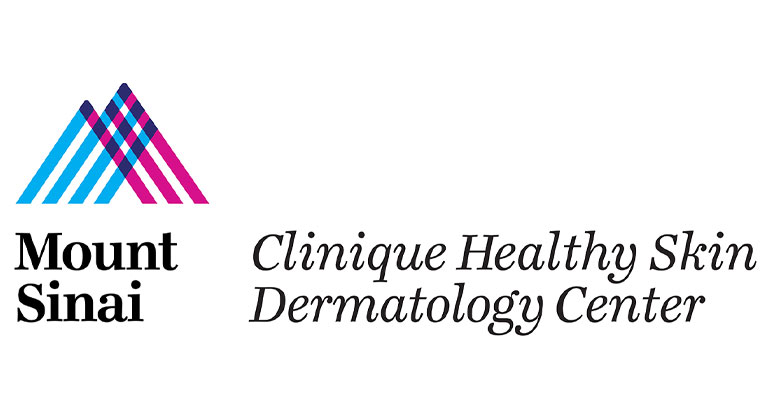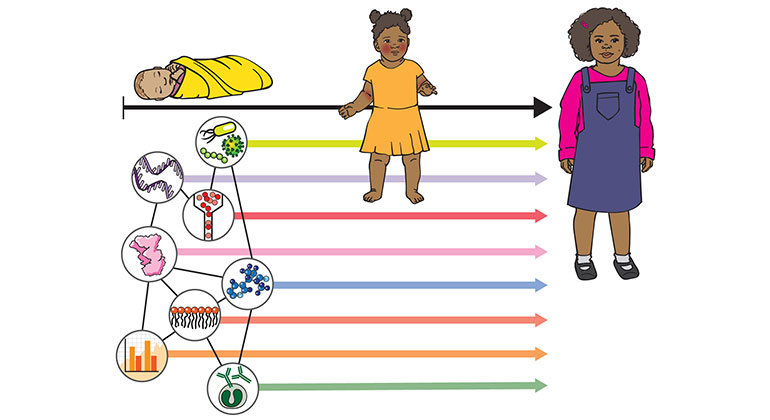Eczema

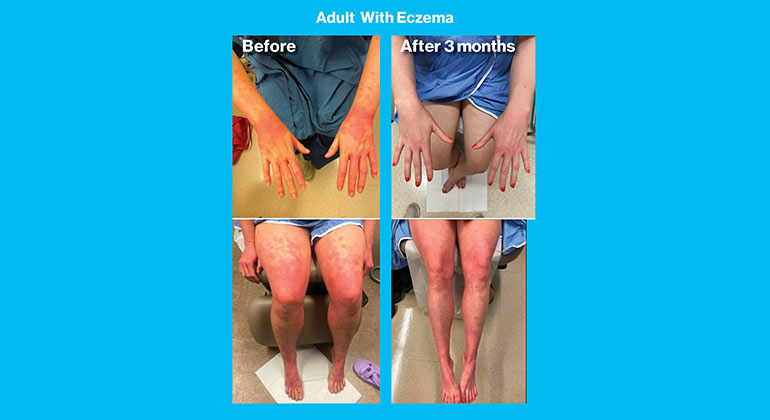
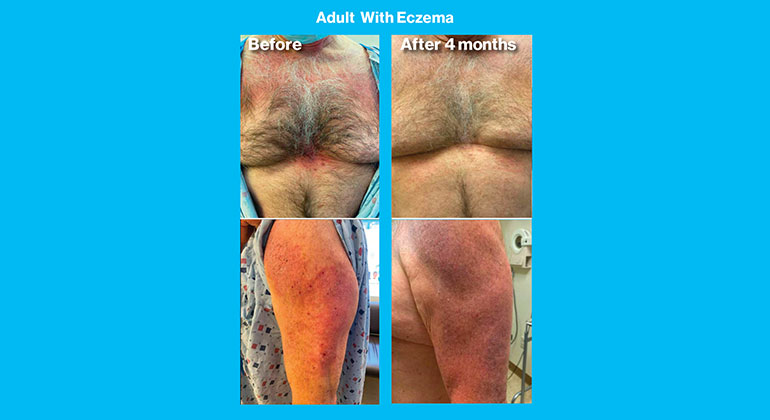
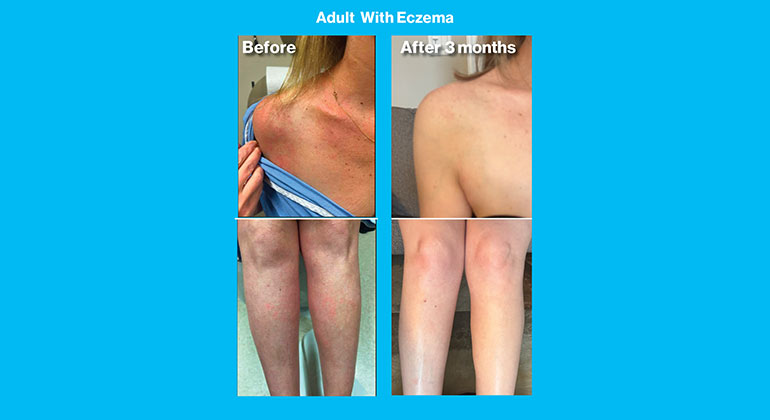
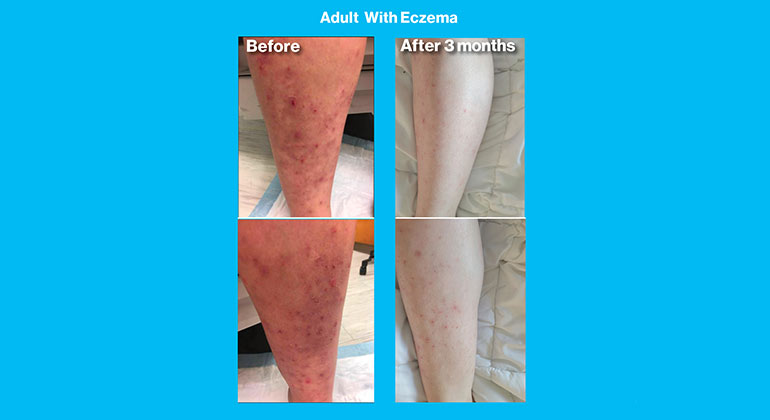
Eczema is one of the most common skin conditions, affecting three percent of Americans. It generally starts in childhood (before age five), but some people develop it later in life. Research suggests that eczema develops due to genetic and environmental factors that make it difficult for the skin to maintain a healthy barrier. When this happens, allergens and bacteria can enter and cause inflammation, leading to eczema.
If you have eczema, you may have some or all of these symptoms:
- Dry, sensitive skin
- Itching
- Oozing and crusting
- Red, scaly patches of skin
- Rough, leathery skin
Types of Eczema
There are several types of eczema. You can develop more than one kind of eczema at a time.
- Atopic dermatitis is a chronic condition that often begins in childhood. If you have asthma or hay fever or a family history of atopic dermatitis, you are at higher risk. Many children grow out of this skin disease, though it can sometimes last into adulthood.
- Contact dermatitis is a rash that develops when your skin touches something you are allergic to. This can include detergents, tobacco smoke, paint, bleach, wool, astringents, acidic food, certain soaps, fragrances, and skin care products, as well as animal dander or pollen.
- Dyshidrotic eczema produces itchy blisters on the edges of the fingers, toes, palms, and soles of the feet. It is often a response to stress, allergies, moist hands and feet, or exposure to metals such as nickel, cobalt, and chromium salts.
- Nummular eczema causes circular, dry spots on the skin that can be very itchy. Researchers believe that it might be related to insect bites, skin inflammation, or dry skin in the winter.
- Seborrheic dermatitis causes skin redness and flaking that tends to appear on the scalp, face, and upper chest. In babies, we call this condition “cradle cap,” though it happens to people of all ages.
- Stasis dermatitis presents as redness, scaling, itching, and pain. You are more likely to have this condition if you have chronic ankle/calf swelling. Usually what happens is you have poor blood flow in your leg veins and some of the fluid leaks out of the veins and irritates the skin. In more severe cases, you could develop oozing, open sores, and infection.
Treatments We Offer
We offer a variety of treatments for eczema, and we work with you to create treatment plans that meet your needs. If you have a mild disease, we usually recommend topical treatments, such as moisturizers or topical anti-inflammatory medications such as steroids or calcineurin inhibitors (tacrolimus, pimecrolimus).
For more severe disease, we may choose from a variety of other treatments:
- Narrow-band ultraviolet B therapy uses a specific type of ultraviolet light to decrease inflammation. This works best if you have a flexible schedule since you would need to come to the office two to three times weekly.
- Cyclosporine is an immune suppressant that rapidly improves eczema symptoms in people with severe disease. If you take this medication, your dermatologist will need to monitor you regularly for changes in your blood and side effects.
- Dupilumab is biologic, a new injectable medication that works well moderate-to-severe eczema. We would give you injections every two weeks. We are testing several new biologics in our clinical trials center.
- Excimer laser treatment uses a high-intensity ultraviolet B light on a small area of skin. It works well for hand and foot eczema.
Why Choose Mount Sinai
At our Center of Excellence in Eczema directed by Dr. Emma Guttman, MD, we treat eczema patients from all over the world. Thanks to our research efforts, we can offer the most advanced therapies for this condition.
We can also test to see if you have an allergy that is making your eczema worse, or is causing contact dermatitis. We design our patch testing to meet your individual needs. Studies have found that food allergies can make eczema symptoms worse in some children. When appropriate, we may refer you to the food allergy experts of the Elliot and Roslyn Jaffe Food Allergy Institute at Mount Sinai.
We perform laboratory research and conduct clinical trials in eczema therapies. This means our patients have access to the very latest treatments.
Eczema Research and Clinical Trials
We offer a number of clinical trials for patients with all types of eczema. We offer trials for topical treatments, pills, and injection medications in patients of all ages.
Some of these developments directly stem from research conducted in our Eczema Program. One such discovery is a treatment targeting a specific white blood cell called a T-helper 22 lymphocyte (Th22), which we found to be highly increased in eczema cases and associated with disease severity.
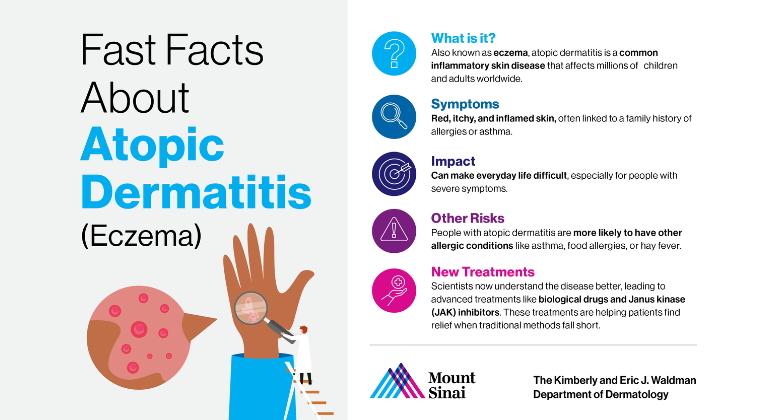
Mount Sinai Experts Author Landmark ‘Seminar’ on Atopic Dermatitis (Eczema) in The Lancet
Feb 13, 2025 View All Press Releases
New Treatment for Moderate to Severe Atopic Dermatitis Shows Promising Long-Term Results
Dec 09, 2022 View All Press Releases